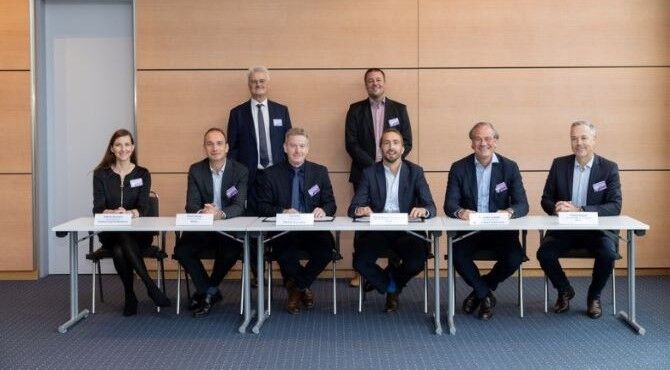Siemens partners with Airbus to decarbonize major industrial sites in the U.S. and U.K.
Siemens to work toward the decarbonization of four Airbus industrial sites in the U.S. and U.K. as part of Airbus’ program to reduce its operational environmental footprint
Program aims to cut energy consumption by 20 percent and Scope 1 and 2 stationary emissions by 85 percent by 2030
Replicable solutions include renewable energy integration, smart energy management, and low-carbon heat systems, delivered in collaboration with Capgemini

Left to right: Sabrina Herrmann - Head of Buildings Germany, Siemens Smart Infrastructure; Benoit Shultz - Chief Procurement Officer, Airbus; Herbert Klipp - Corporate Account Manager, Siemens; Carl Ennis - CEO Siemens UK & Ireland; Jan Schwarz - Vice President Real Estate & Facility Management Procurement, Airbus; Florent Massou dit Labaquère, EVP Operations Commercial Aircraft, Airbus; Carsten Liesener - Global Head Sales & Operations, Siemens Smart Infrastructure; Charles Huguet - Senior Vice President General Procurement, Airbus
As part of the framework agreement, Siemens will deploy its scalable and proven decarbonization solutions, tailored to the selected sites, to support Airbus in reaching the target of 80 kt CO2e abated annually from 2030.
The project will be led by Siemens’ Buildings business and supported by Capgemini, combining the companies’ vast expertise in sustainability and digitalization to ensure the success and timely delivery of the project.
Decarbonization at scale: Scalable solutions for measurable impact
Siemens will evaluate the sites and create and implement an overall decarbonization masterplan for the awarded sites, resulting in scalable solutions to reduce energy demand and carbon emissions. To accelerate the selection of the measures, Energy System Twins will simulate and help determine the best decarbonization roadmaps for the sites. The key elements that will enable this include decarbonization of heat production via heat pumps, energy efficiency upgrades, smart metering systems, on-site smart integration of renewable energy, and smart energy management systems to monitor, control, and optimize usage across the sites. These measures are designed to help Airbus achieve its targets of reducing energy consumption by 20 percent and Scope 1 and 2 greenhouse gas emissions by 85 percent through 2030, compared to 2015 levels.Capgemini has been appointed by Siemens for the program to complete first phase consulting activities, governance definition, and support for project management and planning. Capgemini also brings its expertise in the digitalization and automation of the energy monitoring and measurement systems.
“Our collaboration with Airbus is built on years of mutual trust and shared ambition. It highlights Siemens’ capability to deliver smart and scalable technologies and services to reduce the carbon footprint of Airbus. At Siemens, we’re committed to making the energy transition not only sustainable, but also achievable and scalable, so that Airbus and other industrial leaders can confront climate challenges while boosting operational resilience and long-term competitiveness,” said Susanne Seitz, CEO of Buildings at Siemens Smart Infrastructure.
“We’re proud to be taking this important step toward making our operations more energy-efficient and future-ready. Collaborating with trusted partners is key in building a more resilient industrial footprint. The site-specific expertise from our Airbus colleagues in the U.K. and the U.S. combined with Siemens’ technical know-how will keep us on the path toward meeting our energy use and emission reduction targets,” said Florent Massou dit Labaquere, EVP Operations of Airbus Commercial Aircraft.
Read related articles
- Untapped resources: the value of accompanying partners in global mobility
- Ethical governance of executive compensation
- Fuelling the UK’s hydrogen economy
- Dubai’s Arbor School Named Global Winner of World’s Best School Prize for Environmental Action
Roadmap to 2030
The initial phase began in summer 2025 with the development of decarbonization roadmaps for each site. Engineering studies will guide the implementation, with infrastructure rollout starting in 2026. Siemens can also operate and maintain the new infrastructure, ensuring long-term efficiency and resilience.Siemens and Airbus have been working together for more than half a century. Key initiatives have included factory automation, industrial software, safety and security, building automation technology, and beyond. This new agreement builds on successful collaboration to support Airbus’ sustainability ambitions and achieve its targets for minimizing its operational environmental footprint.


 Your opportunity to explore global mobility policy and practices and how to support international workforce and their families. Download ESG mini-factsheets
Your opportunity to explore global mobility policy and practices and how to support international workforce and their families. Download ESG mini-factsheets- Environmental interventions – global mobility
- Understanding ESG and its importance
- Environmental interventions – branding
- Social interventions – CSR
- Social interventions – diversity and inclusion
- Governance issues – employee engagement
- Governance issues – leadership approaches

Find out more about the Think Global People and Think Women community and events.
Subscribe to Relocate Extra, our monthly newsletter, to get all the latest international assignments and global mobility news.Relocate’s new Global Mobility Toolkit provides free information, practical advice and support for HR, global mobility managers and global teams operating overseas.
©2026 Re:locate magazine, published by Profile Locations, Spray Hill, Hastings Road, Lamberhurst, Kent TN3 8JB. All rights reserved. This publication (or any part thereof) may not be reproduced in any form without the prior written permission of Profile Locations. Profile Locations accepts no liability for the accuracy of the contents or any opinions expressed herein.






























